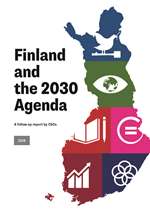Short-term advantage trumps long-term implementation in Finland
Published on Thu, 2020-01-30 10:23
In Finland, the civil society report of Fingo, the association of Finnish development NGOs, concludes that “conflicts of interest between actors lead to decisions where a short-term economic advantage eclipses long-term sustainability.” Finland claims to be “among the first to draft a national implementation plan, to initiate sustainable development budgeting, to establish an inclusive monitoring system and a citizens’ panel, and commission an external evaluation of the world's first national 2030 Agenda policy, the PATH2030 report published in March 2019”. Yet, the alternative report shows that Finland is not consistently committed to the human rights-based approach of the 2030 Agenda, to ensure that “no one is left behind”. Further, “the 2030 Agenda is widely known about in Finland, but there is no consistent understanding of its interpretation and political significance”. Finland also has trade-offs between domestic consumption and environmental obligations. The country “consumes more than our fair share environmentally, and this has significant impacts, including beyond our borders. For example, it is estimated that almost half of our water footprint is made up of production chains that take place elsewhere”. The report also finds “a mismatch between Finland’s rhetoric on global responsibility and its funding commitments. The almost 40 percent cut in development funding by the government of Juha Sipilä and the redirection of the income from emissions trading to private investments eroded our international credibility and demoted Finland from the Nordic reference group”. Financing of NGO development cooperation was cut back even more (43%), even though it is precisely these organizations that are able to reach the most vulnerable in a cost-effective manner. Introduction/summary by Outi Hakkarainen, Finnish Development NGOS Fingo. Read this national chapter here. » |
SUSCRIBE TO OUR NEWSLETTER



